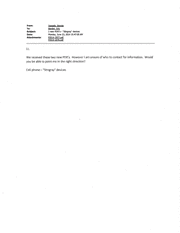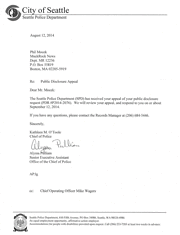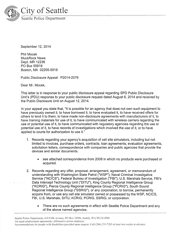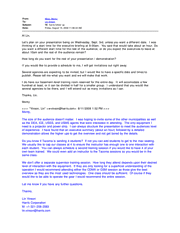Cell site simulator acquisition and use (Seattle Police Department)
| Tracking # |
P2014-2076 |
| Submitted | June 20, 2014 |
MuckRock users can file, duplicate, track, and share public records requests like this one. Learn more.
Communications
From: Phil Mocek
To Whom It May Concern:
Pursuant to RCW Ch. 42.56 (Public Records Act), I hereby request the following records:
## Background ##
Cell site simulators, also known as IMSI catchers, IMEI catchers, GSM interceptors, covert cellular tracking equipment, and digital analyzers, impersonate a wireless service provider's (i.e., mobile phone company's or cellular phone company's) cell tower, prompting mobile phones and other wireless devices to communicate with the simulators instead of with the real cell towers. These devices are often called "Stingrays," the name of one such device produced by Harris Corporation, along with their AmberJack, BlackFin, KingFish, Gossamer, LoggerHead, and TriggerFish devices.
Cell site simulators are commonly used in several ways: to collect unique numeric identifiers associated with each mobile phone in a given geographic area, to determine the precise location of a mobile phone when numbers associated with it are known but only a rough idea of its location is known, or to intercept phone calls and SMS messages.
Each of these uses raises privacy concerns, the most obvious of which is presented by the interception of voice and SMS messages. Collecting unique identifiers of all phones in a particular area inevitably collects location data on many innocent people who are suspected of no crime. Determination of the precise location of a specific phone can reveal that the phone, and thus the person who operates it, is in a constitutionally-protected place, such as a home, that has traditionally been immune from search without judicial approval via search warrant. The locations of people's mobile phones reveal a variety of personal information, such as: with whom they associate, where they assemble, where they spend their days, where they spend their nights, when they are home alone, where they protest, where they worship, and health care providers they visit.
It has been widely reported in recent months that law enforcement agencies use these devices while hiding their use from the public and from the courts.
Despite widespread public interest in the use and misuse of cell site simulators, the public lack information about your agency's use of these devices or about your agency's policy for such use. Information is needed so the public can determine whether use of cell site simulators by your agency complies with the Fourth Amendment to the U.S. Constitution and with Washington law.
## Request ##
Pursuant to Chapter 42.56 RCW, the Public Records Act, I request:
1. Records regarding your agency's acquisition of cell site simulators, including but not limited to invoices, purchase orders, contracts, loan agreements, evaluation agreements, solicitation letters, correspondence with companies and public agencies that provide the devices, and similar documents.
2. Records regarding any offer, proposal, arrangement, agreement, or memorandum of understanding with Washington State Patrol ("WSP"), Naval Criminal Investigative Service ("NCICS"), Federal Bureau of Investigation ("FBI"), U.S. Marshals Service, FBI's Data Intercept Technology Unit ("DITU"), King County Regional Intelligence Group ("KCRIG"), Pierce County Regional Intelligence Group ("PCRIG"), South Sound Regional Intelligence Group ("SSRIG"), or any corporation, to borrow, permanently acquire from, or use any cell site simulator owned or possessed by the WSP, NCICS, FBI, U.S. Marshals, DITU, KCRIG, PCRIG, SSRIG, or corporation
3. All nondisclosure agreements with Harris Corporation, Digital Receiver Technology (DRT, formerly Utica Systems, now a subsidiary of Boeing Corporation), Septier Communication Limited, Proximus LLC, any other corporation, and any state or federal agencies, regarding your agency's actual or potential possession or use of cell site simulators
4. Records regarding policies and guidelines governing use of cell site simulators, including but not limited to 1) when, where, how, and against whom they devices may be used, 2) logging, retention, purging, use, and auditing data stored in or communicated from the devices, 3) under what circumstances administrative warrant, judicial warrant, or other legal process must, should, or should not be obtained prior to, during, or following direct or indirect use of the devices, 4) under what circumstances the existence or use of the devices must, should, or should not be revealed to judges, prosecutors, defense attorneys, criminal defendants, or the general public., and 5) parallel construction techniques for use in avoidance of disclosure of the initial method of discovery of information gained initially by use of cell site simulators
5. Training materials for use of cell site simulators
6. Records regarding any communications or agreements with wireless service providers (i.e., mobile phone carriers such as AT&T, CenturyLink, CREDO Mobile, MetroPCS, Sprint, Ting, T-Mobile, Verizon, Virgin Mobile, etc.) concerning use of cell site simulators
7. Records regarding any communications, licenses, waivers, or agreements, with federal or state communications regulatory agencies (e.g., Federal Communications Commission, Canadian Radio-television and Telecommunications Commission, Washington Utilities and Transportation Commission, Idaho Public Utilities Commission, Oregon Public Utility Commission, etc.) concerning use of cell site simulators
8. Records reflecting the number of investigations in which cell site simulators were used, the number of those investigations that resulted in prosecutions, and the number of those investigations that resulted in convictions
9. Records reflecting a list of all criminal cases, with docket numbers if available, in which law enforcement officers or other staff used or arranged for the use of one or more cell site simulators as part of the underlying investigations
10. All applications submitted to state or federal courts for warrants, orders, or other other authorization for use of cell site simulators in criminal investigations, as well as any warrants, orders, authorizations, denials of warrants, denials of orders, denials of authorization, and returns of warrants associated with those applications
11. Records regarding the use of cell site simulators in closed investigations
12. Date and docket number of any responsive records that are sealed
13. All associated metadata
I also request that, if appropriate, fees be waived as I believe this request is in the public interest. The requested documents will be made available to the general public free of charge as part of the public information service at MuckRock.com, processed by a representative of the news media/press and is made in the process of news gathering and not for commercial usage.
In the event that fees cannot be waived, I would be grateful if you would inform me of the total charges in advance of fulfilling my request. I would prefer the request filled electronically, by e-mail attachment if available or CD-ROM if not.
Thank you in advance for your anticipated cooperation in this matter. I look forward to receiving your response to this request within 5 business days, as the statute requires.
Sincerely,
Phil Mocek
From: SPD-PDR, SPD
RE: Public Disclosure Request # P2014-2076
Dear Mr. Phil Mocek,
This letter is in response to your public disclosure request dated June 20, 2014 and received by the Seattle Police Department’s Public Disclosure Unit on June 20, 2014 for cell cite simulator acquisition and use information.
Pursuant to RCW 42.56.520, this is notification that we have received your public disclosure request, and we anticipate it may take up to 4 weeks from the date of this notification to respond. Therefore we anticipate a response to you on or about July 25, 2014.
This additional time is used to research this request, collect responsive records, and/or prepare records for dissemination. Please note: Seattle Police Department currently receives approximately 4,000 public disclosure requests annually.
If you have any questions or need further assistance with this request, please contact the Public Disclosure Desk at 206-684-5481.
Sincerely,
Kathleen M. O’Toole
Chief of Police
Rodger Stephenson
Admin Specialist II
Public Disclosure Unit
HB:rs
From: MuckRock.com
To Whom It May Concern:
I wanted to follow up on the following Freedom of Information request, copied below, and originally submitted on June 20, 2014. Please let me know when I can expect to receive a response, or if further clarification is needed.
Thank you for your help.
From: SPD-PDR, SPD
RE: Public Disclosure Request # P2014-2076
Dear Mr. Phil Mocek,
This letter is in response to your public disclosure request dated June 20, 2014 and received by the Seattle Police Department’s Public Disclosure Unit on June 20, 2014 for cell cite simulator acquisition and use information.
Your request was sent to the following units with the Seattle Police Department: Criminal Intelligence, Narcotics, Homicide, Sexual Assault, Grants, Vice, and TESU (Technical and Electronic Support Unit) and was advised that the Seattle Police Department does not own any equipment of this type. Therefore we have no responsive records to your request. See the attached “administrative tracking file”.
Additionally a search of the Email archives database for the terms "Cell Site Simulator" or "Stingray" and again received no responsive records to your request.
You may file a written appeal with the Chief of Police within ten (10) business days from the date of this letter. Please include your name and address and a copy of this letter together with a brief statement identifying the basis of the appeal. Please mail or deliver your appeal to:
Chief of Police
Seattle Police Department
PO Box 34986
Seattle, WA 98124-4986
This concludes the Seattle Police Department’s response to your request.
Sincerely,
Kathleen M. O’Toole
Chief of Police
Bonnie Voegele
Records Manager
KMO/bv
From: Phil Mocek
Dear Sir or Madam:
I appeal. Based on the content of the administrative tracking file provided to me, I do not believe that a thorough search for records responsive to my June 20, 2014, request (your identifier: P2014-2076) was performed. The file indicates that few staff were consulted and that their responses did not indicate whether or not responsive records exist. Records Manager Bonnie Voegele claims that seven units of your agency were contacted, but your administrative tracking file indicates only that one was contacted. Your administrative tracking file indicates also that e-mail searches for only two of the dozens of terms mentioned in my request were made.
Both Ms. Voegele's final response to me on July 25, indicating that she believes the claim the department does not own a cell site simulator to imply that none of the 13 classes of records I requested exist, and the July 2 e-mail from Susan Daley to Ms. Voegle in which Ms. Daley stated, "Per Sgt. O'Quin of the Criminal Intelligence Section's Technical Support Unit -- we do not own any of this equipment. Period," communicate the faulty assumption that because Seattle Police Department does not own a cell site simulator, none of the records I requested exists. In response to Ms. Voegele's July 7 e-mail to Ms. Daley in which she emphasized multiple records unrelated to the ownership of cell site simulators, Mr. O'Quin responded on July 8 via e-mail, neither confirming nor denying existence of such records. Mr. O'Quin stated only that 1) one particular unit of your agency (TESU) have not used equipment from one particular manufacturer of cell site simulators (Harris), and 2) that TESU staff are unaware of who used that one manufacturer's equipment "for cases."
It is possible for an agency that does not own such equipment to have previously owned it, to have borrowed it, to have evaluated it, to have received offers for others to lend it to them, to have made non-disclosure agreements with manufacturers of it, to have training materials for use of it, to have communicated with wireless carriers regarding the use or potential use of it, to have communicated with regulatory agencies regarding the use or potential use of it, to have records of investigations which involved the use of it, or to have applied to courts for authorization to use it.
Cordially,
Phil Mocek
From: Seattle Police Department
A letter stating that the request appeal has been received and is being processed.
From: Seattle Police Department
A letter stating that the request appeal has been succesful.
From: Seattle Police Department
A copy of documents responsive to the request.
Files
pages



